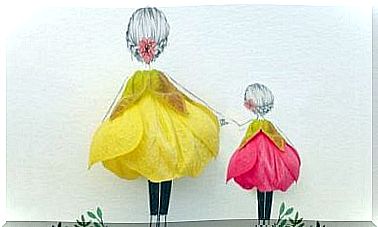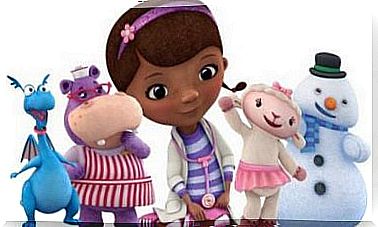Life In The Womb: Emotional Meaning

Even though we are constantly learning more and more about life in the womb , we still do not know much about it. In this article, we examine what babies feel during pregnancy, as well as what it means.
Life in the womb: What the fetus feels
Although specialists have long believed that the development of the uterus was completely biological, they now know that emotions also play a role. Women mainly communicate their emotional state to their children through hormones and physiological reactions.
From the sixth week of pregnancy, the fetus can capture rhythmic sounds around them. It notices, for example, the movement of amniotic fluid or the mother’s heartbeat. In fact, it likes these feelings.
From the 12th week onwards, the fetus is sensitive to its mother’s feelings. It can hear and recognize its mother’s voice and loves to hear it. In fact, the fetus knows if the mother is calm or anxious, and can feel if she is talking lovingly or not.
Even if the fetus itself does not have these feelings, it can perceive the feeling that is conveyed in the mother’s thoughts, feelings and words. As a result, the fetus may feel happy, calm or scared. In addition, the fetus learns to feel loved or rejected based on its mother’s reactions to them.

Emotional meaning
Life in the womb has a greater impact on the fetus than you might think. Even at this early stage , they begin to develop beliefs and behaviors that will accompany them throughout their lives. Stress and anxiety are emotional states that they quickly learn. Babies who absorb negative and painful feelings during pregnancy are at greater risk of going through a difficult birth.
In addition, they often have trouble sleeping and are more likely to suffer from colic, cry more and be less sociable. It can also affect their IQ and increase the risk of developing ADHD.
Children who, on the other hand, feel very positive emotions in the womb are often born heavier, eat and sleep without difficulty and have better immune systems. They become happy, peaceful and balanced people. If you as a mother often feel fulfilled and happy, your baby will remember that information in his cellular memory. Throughout his life, he or she will try to relive the same happiness. Therefore, he is often generally happier.
Love your baby and he will love
But it is not only what you feel during pregnancy that will affect your baby’s emotional development, but also what you think of him or her.
Children who in the womb live in a happy environment and get everything they need from their mother feel calmer. Children who know that their parents want them to develop and that they are loved and protected experience security and love, and therefore develop peacefully. In addition, these feelings accompany them throughout their adult lives.
The children who are not planned and are not wanted, and therefore do not feel loved, grow up on the other hand and feel rejected. They feel the negative feelings their mothers have towards them. They live nine months in the womb feeling insecure, when the person who needs to give them love and nourishment, and the one they are completely dependent on, does not love them back.
If a pregnant woman loses a loved one and the loss makes her end up in deep grief and also makes her disconnect from her pregnancy, the child may feel helpless. If a mother suffers from stress or anxiety from work, the fetus may also feel these worries. If a mother feels abandoned or ill-treated by her partner, the child may also feel abandoned and ill-treated.

Positive life in the womb
What can you do to ensure that your baby has a positive experience in the womb?
- Talk to him or her, sing songs or read fairy tales. Develop an emotional bond with your baby with your voice and your partner’s voice. Sprinkle your baby with sweet and tender words.
- Try to surround yourself with joy and positivity. In addition, you should spend time in nature. For example, you can take a walk in the park.
- Play soothing music for your baby. It will help him or her to feel calm and happy.
- Visualize your child with positive qualities. Imagine that he is happy, successful and loved at all stages of life.









